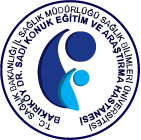ABSTRACT
Conclusion:
In spite of the limited number of patients in our study, we showed that if properly performed exchange transfusion during neonatal period does not affect the hematological status of the children in infancy.
Results:
The most frequent etiology for exchange transfusion were ABO (42%) and Rh (26%) incompatability. The average hematocrit, hemoglobin and ferritin values of children in exchange transfusion group were 32,47%±3,3, 10,64±1,34 g/dl and 34,45±55,1 ng/ml respesctively. The average hematocrit, hemoglobin and ferritin values of children in control group were 32,95%±2,93, 11,31±1,09 g/dl and 21,75±13,23 ng/ml respectively. A statistically significant difference was not observed between two groups regarding hematocrit, hemoglobin and ferritin values (p>0,05).
Material and Methods:
Nineteen children who were treated with exchange transfusion during neonatal period and 21 healthy children were included in the study. The hemoglobin, hematocrit and ferritin values of children in exchange transfusion group were compared with values of healthy children in the same age group.
Objective:
Exchange transfusion is the treatment of choice in cases of neonatal hyperbilirubinemia unresponsive to phototherapy. Vascular, cardiac, metabolic, hematological and infectious complications may be encountered after exchange transfusion. In this study we tried to evaluate the effects of exchange transfusion during neonatal period on hematological parameters in infancy.



